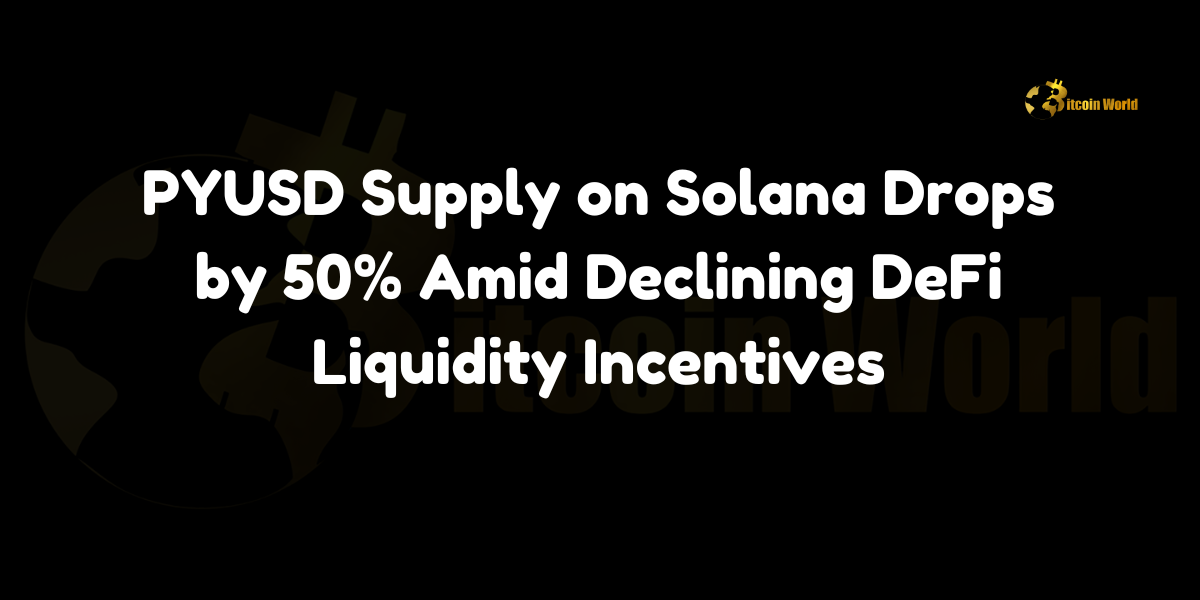PYUSD Supply on Solana Drops by 50% Amid Declining DeFi Liquidity Incentives
The supply of PayPal‘s PYUSD stablecoin on the Solana blockchain has seen a sharp drop of around 50% over the past month, shrinking from $660 million to $320 million, according to a recent report by Blockworks. This significant contraction comes as liquidity incentive programs on Solana, primarily driven by decentralized finance (DeFi) platforms like Kamino, have been reduced, leading to lower demand for PYUSD on the network.
Meanwhile, on the Ethereum network, PYUSD remains relatively stable, with a current supply of $377 million. The stark difference between the two blockchain networks highlights the importance of DeFi liquidity programs in maintaining stablecoin demand, particularly on alternative blockchains like Solana.
The Decline in PYUSD Supply on Solana
In recent months, Solana has positioned itself as one of the leading blockchain networks for stablecoin activity, thanks in part to its high-speed transactions and low fees. PayPal’s PYUSD, a USD-pegged stablecoin, saw rapid adoption on Solana as various DeFi platforms offered incentives for users to provide liquidity in PYUSD pools.
However, as liquidity incentive programs on Solana, such as those offered by Kamino and other DeFi protocols, began to taper off, the demand for PYUSD significantly decreased. These programs play a crucial role in encouraging users to lock up their assets in liquidity pools, where they can earn rewards in return. As these incentives decline, fewer users are willing to hold or stake PYUSD, resulting in a sharp reduction in its circulating supply on Solana.
The contraction in supply could also be attributed to liquidity migration to other blockchains where DeFi incentives remain robust or where users see better opportunities for yield farming and liquidity provision.
DeFi Liquidity Incentives and Their Impact
DeFi liquidity incentives have become a cornerstone of the cryptocurrency ecosystem, especially for stablecoins like PYUSD. By offering rewards to users who provide liquidity, DeFi platforms encourage the use and holding of specific assets, which in turn helps maintain liquidity across various markets and protocols.
On Solana, these incentives have been vital in driving the adoption of stablecoins, particularly PYUSD. However, as these programs wind down or offer fewer rewards, the demand for holding and using PYUSD has diminished, leading to a decrease in supply. This trend underscores the heavy reliance of some blockchain networks on DeFi incentives to maintain stablecoin liquidity.
Without the support of these programs, stablecoins like PYUSD may struggle to maintain their presence on certain blockchains, especially when competing networks like Ethereum continue to offer robust DeFi ecosystems.
PYUSD on Ethereum: A Different Story
While the supply of PYUSD on Solana has been cut in half, its presence on the Ethereum network remains relatively stable, with $377 million worth of PYUSD currently in circulation. Ethereum’s dominance in the DeFi sector is a key reason why PYUSD has maintained its supply on this network. With a more established and diverse DeFi ecosystem, Ethereum offers a wider range of opportunities for liquidity providers, making it a more attractive platform for PYUSD holders.
Ethereum also benefits from a larger and more liquid stablecoin market, allowing PYUSD to integrate seamlessly with other assets and DeFi protocols. This broad ecosystem helps ensure that the demand for PYUSD remains steady, even without the same level of liquidity incentives that have historically driven its growth on Solana.
The Future of PYUSD on Solana and Beyond
The decline in PYUSD supply on Solana raises questions about the future of stablecoins on alternative blockchain networks. As DeFi incentives continue to evolve, blockchain ecosystems may need to rely less on temporary incentives and more on building sustainable use cases and integrations for stablecoins like PYUSD.
For Solana, this could mean focusing on developing long-term utility for PYUSD in areas such as payments, remittances, and other real-world applications, beyond DeFi liquidity farming. Additionally, collaborations with new DeFi platforms or renewed incentive programs could help stabilize PYUSD’s presence on the network.
At the same time, Ethereum’s continued dominance in the DeFi space suggests that PYUSD will likely maintain a strong foothold on this network, where it can benefit from deeper liquidity and broader integration with established DeFi protocols.
Conclusion
The sharp decline in PYUSD’s supply on Solana, dropping from $660 million to $320 million, highlights the significant role that DeFi liquidity incentives play in the adoption and circulation of stablecoins on blockchain networks. As liquidity programs from platforms like Kamino dwindle, the demand for PYUSD has also decreased, creating a noticeable contraction in its supply on the network.
On the other hand, PYUSD’s supply on Ethereum remains stable, supported by the network’s broader and more robust DeFi ecosystem. This divergence between Solana and Ethereum illustrates the varying levels of reliance on DeFi incentives to maintain stablecoin liquidity across different blockchain platforms.
As the landscape continues to evolve, it will be interesting to see how blockchain networks like Solana adapt to ensure stablecoin demand, whether through new incentive programs, utility-focused applications, or further integration with DeFi protocols.
To learn more about the innovative startups shaping the future of the crypto industry, explore our article on latest news, where we delve into the most promising ventures and their potential to disrupt traditional industries.
Disclaimer: The information provided is not trading advice, Bitcoinworld.co.in holds no liability for any investments made based on the information provided on this page. We strongly recommend independent research and/or consultation with a qualified professional before making any investment decisions.




